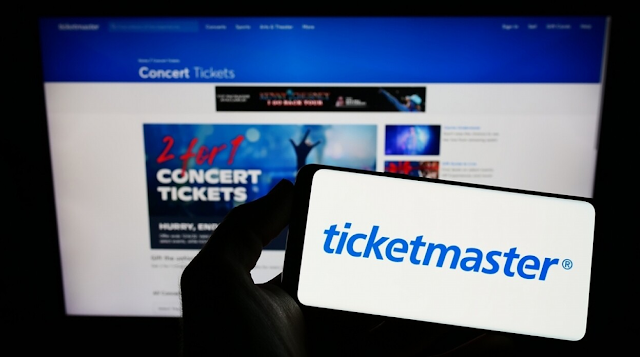Is Your Ticketmaster Data on the Dark Web? Here's What You Need to Know
Introduction
Good morning! It's Daniel de Visé with your Daily Money. Today's edition brings a pressing issue into focus: the security of your personal data. Recently, Ticketmaster and Live Nation have found themselves embroiled in a lawsuit alleging a massive data breach. This incident has put the personal information of 560 million customers at risk, with claims that this data is now up for sale on the dark web.
What Happened with Ticketmaster?
The trouble began when a new lawsuit surfaced, accusing Live Nation and Ticketmaster of allowing a third-party company to access their customers' private information. This breach reportedly resulted in the data of 560 million individuals being listed for sale for a staggering $500,000 on the dark web. The lawsuit, filed by California residents Cynthia Ryan and Rosalia Garcia, aims to hold these companies accountable for their alleged negligence.
The Lawsuit Against Ticketmaster and Live Nation
Cynthia Ryan and Rosalia Garcia took their grievances to California’s Central District Court last week. They accuse Live Nation and Ticketmaster of failing to protect customer data adequately, thus allowing a third-party company to infiltrate their systems. The legal battle is in its early stages, but it has already garnered significant attention due to the scale of the alleged breach.
The Alleged Data Sale on the Dark Web
According to the lawsuit, the stolen customer data was listed for sale on the dark web. The dark web, a hidden part of the internet often used for illegal activities, is notorious for being a marketplace for stolen data. If true, this means that millions of people could be at risk of identity theft, fraud, and other cybercrimes.
Ticketmaster and Live Nation's Response
In response to the allegations, both Ticketmaster and Live Nation have issued statements denying any wrongdoing and asserting that they are investigating the claims. They have emphasized their commitment to protecting customer data and have promised to take necessary steps to enhance their security measures. Additionally, they have provided resources for affected customers, including identity theft protection services and customer support hotlines.
Understanding Data Breaches
A data breach occurs when unauthorized individuals gain access to confidential information. These breaches can happen due to various reasons, such as weak security protocols, phishing attacks, or insider threats. The consequences can be severe, ranging from financial losses to reputational damage for the businesses involved, and significant privacy violations for the individuals affected.
The Impact on Consumers
For consumers, a data breach can mean that their personal information—such as names, addresses, social security numbers, and financial details—is exposed. This exposure can lead to identity theft, financial fraud, and other serious issues. Moreover, such incidents erode consumer trust, making them wary of sharing their information with businesses in the future.
Protecting Your Data Online
To safeguard your personal data, it’s crucial to adopt robust security practices. Use strong, unique passwords for different accounts and enable two-factor authentication whenever possible. Stay vigilant against phishing scams, which often appear as legitimate communications from trusted sources but are designed to steal your information.
Legal Implications of Data Breaches
Data protection laws have been established to hold companies accountable for safeguarding personal information. When companies fail to protect data adequately, they can face significant penalties, including hefty fines and legal actions. Recent high-profile cases have highlighted the importance of stringent data protection measures and the severe consequences of neglecting them.
The Role of Third-Party Companies
Third-party vendors can often introduce vulnerabilities into a company's security framework. It's essential for businesses to manage their relationships with these vendors carefully and ensure they adhere to strict security standards. Regular audits and risk assessments can help mitigate the risks posed by third-party companies.
Consumer Rights and Recourse
If your data has been compromised, you have certain rights and avenues for recourse. You can file a complaint with relevant authorities, seek legal advice, and take steps to protect your identity, such as monitoring your credit reports and enrolling in identity theft protection services.
The Future of Data Security
The landscape of data security is continually evolving, with new threats emerging regularly. However, advancements in cybersecurity technologies, such as artificial intelligence and machine learning, offer promising solutions. Staying informed about these trends and adopting proactive measures can help individuals and businesses stay ahead of potential threats.
Other Notable Legal Battles in Tech
In addition to the Ticketmaster lawsuit, other significant legal battles are shaping the tech industry. For instance, the case against the Fearless Fund, which was blocked from awarding grants to Black women-owned businesses, highlights ongoing civil rights issues within the legal system. These cases underscore the complex interplay between technology, business practices, and the law.
Conclusion
The Ticketmaster data breach incident serves as a stark reminder of the importance of robust data security measures. As consumers, staying informed and taking proactive steps to protect our personal information is crucial. Meanwhile, businesses must prioritize data protection to maintain trust and avoid severe legal repercussions. In this digital age, vigilance and preparedness are our best defenses against the ever-present threat of data breaches.




Comments
Post a Comment